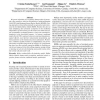36 search results - page 3 / 8 » Solving convex programs by random walks |
NIPS
2008
13 years 9 months ago
2008
We consider the problem of obtaining the approximate maximum a posteriori estimate of a discrete random field characterized by pairwise potentials that form a truncated convex mod...
CVIU
2006
13 years 7 months ago
2006
We present algorithms for recognizing human motion in monocular video sequences, based on discriminative Conditional Random Field (CRF) and Maximum Entropy Markov Models (MEMM). E...
TIT
2010
13 years 2 months ago
2010
This paper is concerned with the problem of recovering an unknown matrix from a small fraction of its entries. This is known as the matrix completion problem, and comes up in a gr...
CORR
2007
Springer
13 years 7 months ago
2007
Springer
—In a sensor network, in practice, the communication among sensors is subject to: 1) errors that can cause failures of links among sensors at random times; 2) costs; and 3) const...
ICCV
2009
IEEE
13 years 5 months ago
2009
IEEE
Finding the largest consensus set is one of the key ideas used by the original RANSAC for removing outliers in robust-estimation. However, because of its random and non-determinis...

